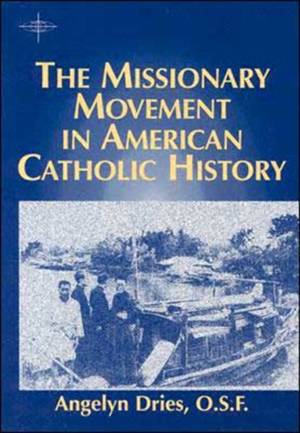
- Afhalen na 1 uur in een winkel met voorraad
- Gratis thuislevering in België vanaf € 30
- Ruim aanbod met 7 miljoen producten
- Afhalen na 1 uur in een winkel met voorraad
- Gratis thuislevering in België vanaf € 30
- Ruim aanbod met 7 miljoen producten
Omschrijving
This is the first general history of American Catholic mission treating not only its institutions but its human and religious aspects as well. It shows how the church in the United States not only sent thousands of men and women overseas but also evangelized internally, and incorporated millions of immigrants. Angelyn Dries offers a thoroughly researched and nuanced view of this history, and its profound influence on the emergence of a distinctive American Catholic identity.
The Missionary Movement in American Catholic History opens with Iberian and French mission efforts on the continent prior to 1776, moves to the situation within the English colonies and the fledgling United States, and then on to mission beyond U.S. borders from 1820. Dries continually places the movement in context, discussing such issues as Nativism, the frontier experience of whites, the fate of Amerindians, the trans-Atlantic slave trade, and the growth of African-American Catholicism.
From 1898 to 1980 Dries considers the experiences of the two World Wars, the rapid decolonizations of Africa and Asia, and the U.S.'s increasingly anti-Communist political stance. With the advent of Vatican II, Dries shows, American Catholics entered more deeply into conscious dialogue with their Protestant brothers and sisters, as well as with Jews. By 1980 this "public" dialogue included non-believers and followers of the world religions in a broadening ecumenism.
Dries concludes with issues facing the missionary movement beyond 1980, including formation and gender issues, the understanding and practice of mission in the future, and the unfinished agenda of the U.S. Bishops' pastoral, "To the Ends of the Earth." The Missionary Movement in American Catholic History is a remarkably comprehensive work, must-reading for missioners and church historians.
.
Specificaties
Betrokkenen
- Auteur(s):
- Uitgeverij:
Inhoud
- Aantal bladzijden:
- 398
- Taal:
- Engels
- Reeks:
- Reeksnummer:
- nr. 26
Eigenschappen
- Productcode (EAN):
- 9781570751677
- Verschijningsdatum:
- 1/04/1998
- Uitvoering:
- Paperback
- Formaat:
- Trade paperback (VS)
- Afmetingen:
- 178 mm x 254 mm
- Gewicht:
- 721 g

Alleen bij Standaard Boekhandel
Beoordelingen
We publiceren alleen reviews die voldoen aan de voorwaarden voor reviews. Bekijk onze voorwaarden voor reviews.











